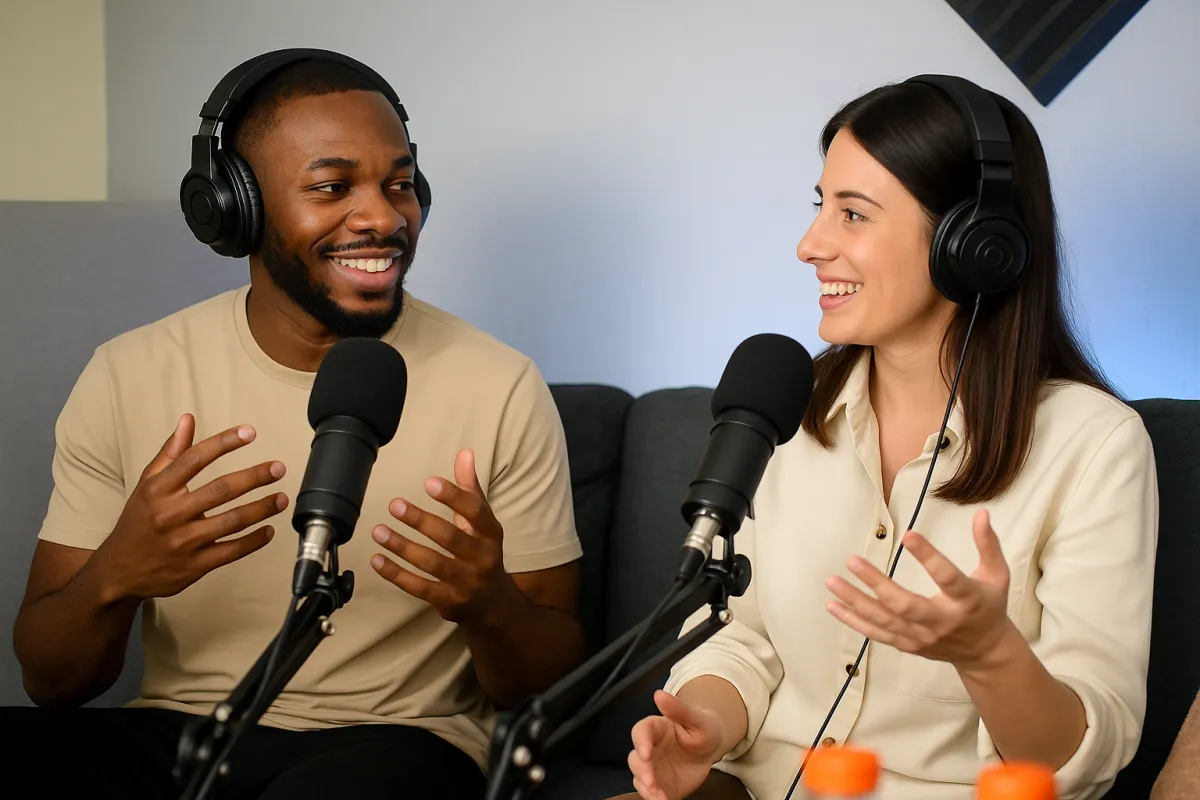
Collaborating with Other Podcasters: Benefits and How-To
Hello, podcasting world! Collaboration is a key ingredient in the recipe for podcasting success. Whether you're just starting out or looking to grow your audience, teaming up with fellow podcasters can open up a world of opportunities. And hey, at Podcast HQ in Hollywood, FL, we've seen some incredible collaborations come to life, proving that two (or more) heads are often better than one. Let’s explore the benefits of podcast collaborations and how to make them happen.
Benefits of Collaborating with Other Podcasters
1. Expanded Audience Reach
One of the biggest advantages of collaboration is audience exposure. You’re not just promoting to your current followers — you’re getting in front of theirs, too. If both of you average 1,000 listeners, a single collaboration could potentially expose your show to 2,000+ new ears.
This is especially powerful when your audiences share similar interests but haven't yet discovered your show. For example:
A mental health podcast partnering with a fitness show
A comedy podcast collaborating with a pop culture recap show
✅ Pro Tip: Include a call-to-action in both intros and outros to encourage cross-following and subscriptions.
2. Fresh Content and Perspectives
Your podcast gains depth when new voices join the mix. Guests and co-hosts bring:
New stories
Alternative viewpoints
Unique audience questions
Different tones, energies, and pacing
This can reinvigorate a stale format and surprise loyal listeners in the best way. It also allows you to explore angles you may not have tackled alone.
🎙️ Think of it like inviting someone to your studio at Podcast HQ — they walk in with their own ideas, humor, and energy that change the dynamic for the better.
3. Learning and Growth
Every podcaster has their own toolkit — from how they prep interviews to how they edit or market.
Collaborating is an informal masterclass in:
Hosting styles
Branding strategies
Sponsorship handling
Episode structure
Monetization ideas
Just one joint episode might unlock something you can implement in your own process long-term.
4. Networking Opportunities
Your collaboration could be the first of many.
Podcasting is a relationship-based industry. Each connection might:
Introduce you to future guests
Lead to live event invitations
Get you inside private podcaster communities
Lead to co-branded products or services
🤝 You’re not just building content — you’re building a professional network that can support your growth beyond the episode.
How to Collaborate with Other Podcasters
1. Identify Potential Collaborators
Start by thinking about what kind of voices or perspectives would add to your show. Look for:
Complementary (not competing) niches
Similar values or vibes
Audiences with overlap potential
Search relevant hashtags on social media, browse Apple Podcasts categories, or explore podcast guest directories to find matches.
2. Reach Out
Send a personal, thoughtful message — not a generic pitch. Mention:
What you enjoy about their podcast
Why you think a collaboration makes sense
A quick idea of what it could look like
Keep it short, clear, and collaborative. Bonus if you can reference a specific episode or quote of theirs you appreciated.
3. Plan Your Collaboration
Once they’re on board, jump into logistics.
Questions to answer together:
Format: Guest interview? Joint episode? Swap? Panel?
Recording setup: Zoom, Riverside, in-studio (maybe at Podcast HQ?)
Topic: What will you cover, and how will each of you contribute?
Promotion plan: Will you both post on all platforms? Tag each other? Create teaser clips?
📝 Document everything in a shared Google Doc or Notion board to stay organized.
4. Promote Effectively
A great collaboration deserves a great rollout.
Tactics to consider:
Create co-branded visuals and audiograms
Tease the collab 3–5 days in advance
Schedule cross-posts and mutual shoutouts
Use platform tools like Instagram Collabs or TikTok Duets
💡 Include each other’s podcast links in the show notes and captions.
5. Measure and Reflect
After the episode airs:
Watch download numbers for spikes
Review listener feedback
Monitor engagement on social media
Debrief with your collaborator: What went well? What could improve?
Use the insight to refine your process for future collaborations.
Examples of Successful Collaborations
“The Read” x “Another Round”: Their crossover brought hilarious and meaningful commentary to both audiences, proving that chemistry and aligned topics can create unforgettable moments.
True Crime Collabs: Shows like Crime Junkie and Morbid often swap hosts or share cases to cross-pollinate their large and loyal followings.
Niche B2B Shows: Many business and marketing podcasts bring on similarly-sized creators in their niche for topical breakdowns, improving credibility and attracting leads.
Final Thoughts
Collaborating with other podcasters isn’t just about exposure — it’s about creating deeper connections, sharpening your skills, and leveling up your content.
It’s a win for your show, your brand, and your audience.
So go ahead: reach out to that podcaster you've been following, invite them into your creative space (virtual or IRL at Podcast HQ), and build something together that neither of you could’ve created alone.